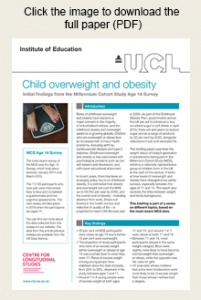One in five young people obese at age 14
News
12 December 2017

One in five young people born in the UK at the turn of the century was obese by the age of 14, and a further 15 per cent were found to be overweight.
Researchers from the Centre for Longitudinal Studies (CLS) at the UCL Institute of Education analysed information on more than 10,000 teenagers who are taking part in the Millennium Cohort Study.
These latest findings reinforce the importance of plans from UK governments to tackle the childhood obesity epidemic over the coming years.
In response to public concern over childhood obesity, the most significant steps in recent government policy include the introduction of a levy on added sugar in soft drinks in April 2018, and a programme to reduce sugar across a range of products by 20 per cent by 2020, alongside reductions in salt and saturated fat.
The report from CLS, which is published with a briefing paper on Thursday (7 December), reveals that although the same proportion of boys and girls were obese (20%), rates of overweight were slightly higher for girls (16%) than boys (13%).
Rates of excess weight varied by country, with almost 40 per cent of young people in Northern Ireland overweight or obese, compared to 38 per cent in Wales, and 35 per cent in both Scotland and England.
There was a clear link between young people’s weight and their mothers’ level of education. Almost 40 per cent of 14-year-olds whose mothers had only GCSE qualifications were overweight or obese, compared to 26 per cent of those whose mothers had a degree or higher qualifications.
 In addition, children who were breastfed as infants, and those whose parents owned their home, had lower odds of being overweight and obese at age 14.
In addition, children who were breastfed as infants, and those whose parents owned their home, had lower odds of being overweight and obese at age 14.
The researchers also analysed information on children’s height and weight at ages 3, 5, 7, 11 and 14, to uncover patterns of weight gain across childhood. They found that rates of overweight and obesity increased slightly from ages 3 to 7, but rose significantly at age 11, from 25 per cent to 35 per cent, with this increase being especially strong among boys.
By age 14, however, they discovered that rates of excess weight had stabilised. While boys were slightly less likely to have become overweight and obese than to have become a normal weight by age 14, for girls the opposite was the case.
Professor Emla Fitzsimons, co-author of the study, said: “Childhood overweight and obesity is a global concern. Children who are overweight or obese face an increased risk of many health problems later in life, including cardiovascular disease and type 2 diabetes. Overweight and obesity are also associated with psychological problems such as low self-esteem and depression, and with lower educational attainment.
“As members of the millennium generation reach early adolescence rates of obesity and overweight remain a public health concern. These findings show that although rates of excess weight have stabilised since age 11, there is still a worryingly high proportion of young people in this generation who are an unhealthy weight.”
Dr Benedetta Pongiglione, co-author, said: “This report provides important evidence to underpin the commitment of governments across the UK to reducing levels of overweight and obesity in childhood. It will now be vitally important to monitor whether key policies, such as the levy on soft drinks and sugar reduction across food products, has a positive impact on the health of this generation.”
Read the full paper
‘Prevalence and trends in overweight and obesity in childhood and adolescence – Findings from the Millennium Cohort Study, with a focus on age 14’ by Dr Benedetta Pongiglione and Professor Emla Fitzsimons.
For further information please contact:
Ryan Bradshaw – UCL Institute of Education
r.bradshaw@ucl.ac.uk
020 7612 6516
Katherine Butler – UCL Institute of Education
k.butler@ucl.ac.uk
020 7911 5389
Notes for editors:
- At age 14, the study participants had their weight, height and body fat measured. Levels of overweight and obesity were based on their body mass index (BMI), which measures the ratio between height and weight. It is calculated by dividing weight in kilograms by squared height in metres. The current study uses the UK90 classification system for defining overweight and obesity.
- The Millennium Cohort Study is following 19,517 young people born across the UK in 2000-01, building a uniquely detailed portrait of the children of the new century. The last survey of parents and children took place in 2015/16 when 11,726 young people took part. The analysis of data on physical development is published for the first time today. The study is funded by the Economic and Social Research Council and a consortium of government departments, and managed by the Centre for Longitudinal Studies at the UCL Institute of Education.
- The UCL Institute of Education is a world-leading centre for research and teaching in education and social science, ranked number one for education worldwide in the 2014, 2015, 2016 and 2017 QS World University Rankings. It was awarded the Queen’s Anniversary Prize in 2016. In 2014, the IOE secured ‘outstanding’ grades from Ofsted on every criterion for its initial teacher training, across primary, secondary and further education programmes. In the most recent Research Excellence Framework assessment of university research, the IOE was top for ‘research power’ (GPA multiplied by the size of the entry) in education. Founded in 1902, the Institute currently has more than 8,000 students and 800 staff. In December 2014 it became a single-faculty school of UCL, called the UCL Institute of Education. www.ucl.ac.uk/ioe
- UCL was founded in 1826. It was the first English university established after Oxford and Cambridge, the first to open up university education to those previously excluded from it, and the first to provide systematic teaching of law, architecture and medicine. It is among the world’s top universities, as reflected by performance in a range of international rankings and tables. UCL currently has over 39,000 students from 150 countries and over 12,500 staff. UCL’s annual income is more than £1 billion.www.ucl.ac.uk| Follow @uclnews| Watch YouTube.com/UCLTV
- The Economic and Social Research Council (ESRC) is the UK’s largest funder of research on the social and economic questions facing us today. It supports the development and training of the UK’s future social scientists and also funds major studies that provide the infrastructure for research. ESRC-funded research informs policymakers and practitioners and helps make businesses, voluntary bodies and other organisations more effective. The ESRC also works collaboratively with six other UK research councils and Innovate UK to fund cross-disciplinary research and innovation addressing major societal challenges. The ESRC is an independent organisation, established by Royal Charter in 1965, and funded mainly by the Government. www.esrc.ac.uk
Back to news listing






